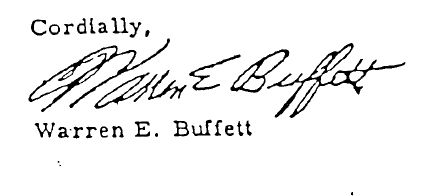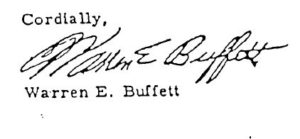One of our favorite investors at The Acquirer’s Multiple is of course Warren Buffett.
As a value investor, one of the most important free investing resources is Buffett’s earliest partnership letters. Each contains hidden gems of value investing wisdom.
One of my favorite gems is in his 1966 partnership letter which contained his views on ‘market forecasting’, it’s a must read for all investors.
Here’s an excerpt for that partnership letter:
Market Forecasting
Ground Rule No. 6 (from our November packet) says: “I am not in the business of predicting general stock market or business fluctuations. If you think I can do this, or think it is essential to an investment program, you should not be in the partnership.”
Of course, this rule can be attacked as fuzzy, complex, ambiguous, vague, etc. Nevertheless, I think the point is well understood by the great majority of our partners. We don’t buy and sell stocks based upon what other people think the stock market is going to do (I never have an opinion) but rather upon what we think the company is going to do.
The course of the stock market will determine, to a great degree, when we will be right, but the accuracy of our analysis of the company will largely determine whether we will be right. In other words, we tend to concentrate on what should happen, not when it should happen.
In our department store business I can say with considerable assurance that December will be better than July. (Notice how sophisticated I have already become about retailing.) What really counts is ‘whether December is better than last December by a margin greater than our competitors’ and what we are doing to set the stage for future Decembers.
However, in our partnership business I not only can’t say whether December will be better than July, but I can’t even say that December won’t produce a very large loss, it sometimes does. Our investments are simply not aware that it takes 365-1/4 days for the earth to make it around the sun.
Even worse, they are not aware that your celestial orientation (and that of the IRS) requires that I report to you upon the conclusion of each orbit (the Earth’s – not ours). Therefore, we have to use a standard other than the calendar to measure our progress. This yardstick is obviously the general experience in securities as measured by the Dow.
We have a strong feeling that this competitor will do quite decently over a period of years (Christmas will come even if it’s in July) and if we keep beating our competitor we will have to do something better than “quite decently”. It’s something like a retailer measuring his sales gains and profit margins against Sears’ – beat them every year and somehow you’ll see daylight.
I resurrect this “market-guessing” section only because after the Dow declined from 995 at the peak in February to about 865 in May, I received a few calls from partners suggesting that they thought stocks were going a lot lower.
This always raises two questions In my mind:
(1) If they knew In February that the Dow was going to 865 in May, why didn’t they let me in on it then, and,
(2) If they didn’t know what was going to happen during the ensuing three months back in February, how do they know in May?
There is also a voice or two after any hundred point or so decline suggesting we sell and wait until the future is clearer.
Let me again suggest two points:
(1) the future has never been clear to me (give us a call when the next few months are obvious to you – or, for that matter, the next few hours) and,
(2) no one ever seems to call after the market has gone up one hundred points to focus my attention on how unclear everything is, even though the view back in February doesn’t look so clear in retrospect.
If we start deciding, based on guesses or emotions, whether we will or won’t participate in a business where we should have some long run edge, we’re in trouble. We will not sell our interests in businesses (stocks) when they are attractively priced just because some astrologer thinks the quotations may go lower even though such forecasts are obviously going to be right some of the time.
Similarly, we will not buy fully priced securities because “experts’ think prices are going higher. Who would think of buying or selling a private business because of someone’s guess on the stock market?
The availability of a quotation for your business interest (stock) should always be an asset to be utilized if desired. If it gets silly enough in either direction, you take advantage of it. Its availability should never be turned into a liability whereby its periodic aberrations in turn formulate your judgement.
A marvelous articulation of this idea is contained in chapter two (The Investor and Stock Market Fluctuations) of Benjamin Graham’s “The Intelligent Investor”. In my opinion, this chapter has more investment importance than anything else that has been written.
For all the latest news and podcasts, join our free newsletter here.
Don’t forget to check out our FREE Large Cap 1000 – Stock Screener, here at The Acquirer’s Multiple:





